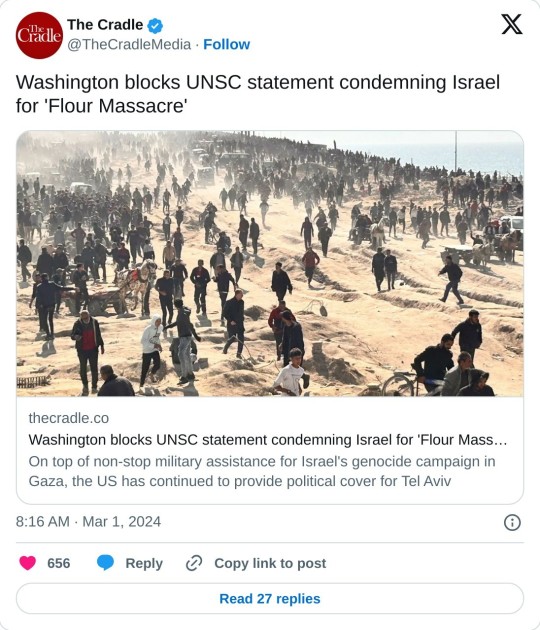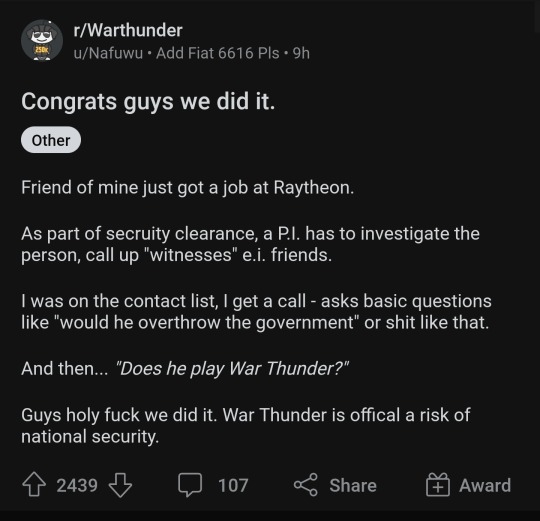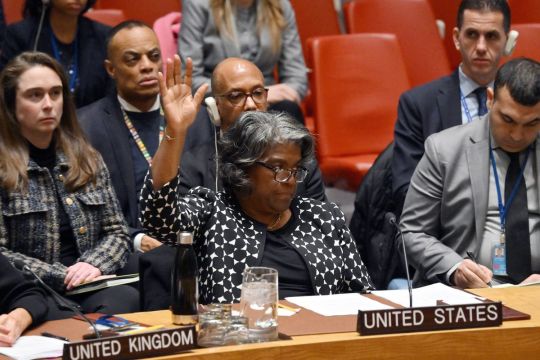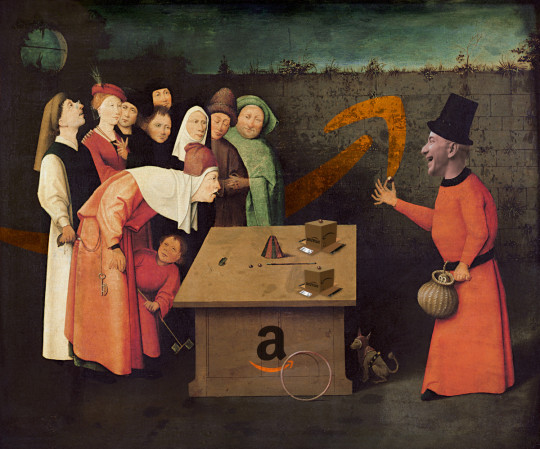#National-Security
Text

The US, on 29 February, vetoed a UN Security Council (UNSC) statement that would have condemned Israel for the mass murder of over 100 Palestinian civilians who were awaiting the delivery of humanitarian aid in Gaza City.
“We don’t have all the facts on the ground – that’s the problem,” US deputy ambassador to the UN Robert Wood told reporters on Thursday.
He then claimed there are “contradictory reports” about the Israeli army's latest massacre and highlighted that Washington was focused on finding “some language that everyone can agree on.”
Thursday's veto is the fifth time Washington has blocked a UNSC statement or ceasefire resolution that would hold Israel accountable for the atrocities it has committed in Gaza.
#yemen#jerusalem#tel aviv#current events#palestine#free palestine#gaza#free gaza#news on gaza#palestine news#news update#war news#war on gaza#genocide joe#united nations#united nations security council#joe biden#gaza genocide#genocide
21K notes
·
View notes
Text
No difference except , the zionists made it worse , they stripped them from their clothes

#palestine#gaza#israeli war crimes#war criminals#war crimes#free gaza#united nations#unicef#amnesty international#free palestine#crimes against humanity#human rights#human rights watch#united nations security council#united nations secretary general#the united nations#un security council#secretary general#un secretary general#unsc#international court of justice#the international court of justice#stop the genocide#stop genocide in gaza#ceasefire now#ceasfire now#jerusalem#colonialism#imperialism#humanitarian crisis
4K notes
·
View notes
Text
IT FINALLY HAPPENED

PLAYING WAR THUNDER IS NOW A VIABLE THREAT TO NATIONAL SECURITY
Update: post is fake, playing War Thunder doesn't make you a national security risk.
7K notes
·
View notes
Text

ruin out here forcing me to learn how to actually draw the animatronics

#how is he blushing when he doesn't have any blood? idk man it's the future they can do whatever#also congrats fronnie nation you have officially gained another soldier#after a year and a half of being in denial over liking a ship between two robot animals from a shitty indie horror game#i've just accepted my fate#fnaf#five nights at freddy's#fnaf security breach#fnaf ruin#glamrock freddy#glamrock bonnie#fnaf gregory#security breach gregory#fronnie#fnaf fanart#security breach fanart
2K notes
·
View notes
Text
Kristen and Fig 🤝 Adaine and Fabian
The Prophet and Her Champion
#two different uses of the word prophet here but you get it#adaine and kristen being the most important person in the world to a nation/god#and then they got their security detail to beat up anyone who threatens them#fantasy high#junior year spoilers#adaine abernant#kristen applebees#figeroth faeth#fabian seacaster
653 notes
·
View notes
Text

🇺🇸⚔️🇵🇸 🚨
UNITED STATES VETOS PALESTINIAN MEMBERSHIP TO THE UNITED NATIONS
In a vote today in the United Nations Security Council (UNSC) on a resolution to grant membership into the UN for Palestine was vetoed by the United States.
The vote for Palestinian membership was supported by the vast majority of UNSC members, with 12 votes in favor, one against, and two abstentions.
US representative to the UN for Special Political Affairs, Robert Wood, argued that Palestine could not be admitted as long as Hamas controlled the Gaza Strip, echoing Zionist arguments over Palestine's membership, at one point arguing, “there are unresolved questions as to whether [Palestine] meets the criteria to be considered a state," without ever mentioning the Israeli occupation that makes such criteria unlikely to ever be satisfied.
Palestine is currently a "Permanent Observer State" without voting rights at the United Nations.
#source
@WorkerSolidarityNews
#united nations#united states#us news#us politics#us imperialism#palestine#palestine news#palestinians#free palestine#free gaza#end the occupation#ceasefire now!#gaza#gaza strip#gaza news#israel#israel palestine conflict#war#occupation#israeli occupation#politics#news#geopolitics#world news#global news#international news#breaking news#current events#un#united nations security council
584 notes
·
View notes
Text

''Can I be the Bonnie to your Freddy?''
''You already are, you always were.''
💙🧡
#daske art#fnaf#beckory#fnaf security breach#five nights at freddy's#detective rabbit#five nights at freddy's security breach#fnaf GGY#fnaf gregory#tony becker#fnaf sb#gregtony#GTY46#ah the things i do for gay ppl...#happy valentine's day beckory nation <3
523 notes
·
View notes
Text
Amazon’s financial shell game let it create an “impossible” monopoly

I'm on tour with my new, nationally bestselling novel The Bezzle! Catch me in TUCSON (Mar 9-10), then San Francisco (Mar 13), Anaheim, and more!

For the pro-monopoly crowd that absolutely dominated antitrust law from the Carter administration until 2020, Amazon presents a genuinely puzzling paradox: the company's monopoly power was never supposed to emerge, and if it did, it should have crumbled immediately.
Pro-monopoly economists embody Ely Devons's famous aphorism that "If economists wished to study the horse, they wouldn’t go and look at horses. They’d sit in their studies and say to themselves, ‘What would I do if I were a horse?’":
https://pluralistic.net/2022/10/27/economism/#what-would-i-do-if-i-were-a-horse
Rather than using the way the world actually works as their starting point for how to think about it, they build elaborate models out of abstract principles like "rational actors." The resulting mathematical models are so abstractly elegant that it's easy to forget that they're just imaginative exercises, disconnected from reality:
https://pluralistic.net/2023/04/03/all-models-are-wrong/#some-are-useful
These models predicted that it would be impossible for Amazon to attain monopoly power. Even if they became a monopoly – in the sense of dominating sales of various kinds of goods – the company still wouldn't get monopoly power.
For example, if Amazon tried to take over a category by selling goods below cost ("predatory pricing"), then rivals could just wait until the company got tired of losing money and put prices back up, and then those rivals could go back to competing. And if Amazon tried to keep the loss-leader going indefinitely by "cross-subsidizing" the losses with high-margin profits from some other part of its business, rivals could sell those high margin goods at a lower margin, which would lure away Amazon customers and cut the supply lines for the price war it was fighting with its discounted products.
That's what the model predicted, but it's not what happened in the real world. In the real world, Amazon was able use its access to the capital markets to embark on scorched-earth predatory pricing campaigns. When diapers.com refused to sell out to Amazon, the company casually committed $100m to selling diapers below cost. Diapers.com went bust, Amazon bought it for pennies on the dollar and shut it down:
https://www.theverge.com/2019/5/13/18563379/amazon-predatory-pricing-antitrust-law
Investors got the message: don't compete with Amazon. They can remain predatory longer than you can remain solvent.
Now, not everyone shared the antitrust establishment's confidence that Amazon couldn't create a durable monopoly with market power. In 2017, Lina Khan – then a third year law student – published "Amazon's Antitrust Paradox," a landmark paper arguing that Amazon had all the tools it needed to amass monopoly power:
https://www.yalelawjournal.org/note/amazons-antitrust-paradox
Today, Khan is chair of the FTC, and has brought a case against Amazon that builds on some of the theories from that paper. One outcome of that suit is an unprecedented look at Amazon's internal operations. But, as the Institute for Local Self-Reliance's Stacy Mitchell describes in a piece for The Atlantic, key pieces of information have been totally redacted in the court exhibits:
https://www.theatlantic.com/ideas/archive/2024/02/amazon-profits-antitrust-ftc/677580/
The most important missing datum: how much money Amazon makes from each of its lines of business. Amazon's own story is that it basically breaks even on its retail operation, and keeps the whole business afloat with profits from its AWS cloud computing division. This is an important narrative, because if it's true, then Amazon can't be forcing up retail prices, which is the crux of the FTC's case against the company.
Here's what we know for sure about Amazon's retail business. First: merchants can't live without Amazon. The majority of US households have Prime, and 90% of Prime households start their ecommerce searches on Amazon; if they find what they're looking for, they buy it and stop. Thus, merchants who don't sell on Amazon just don't sell. This is called "monopsony power" and it's a lot easier to maintain than monopoly power. For most manufacturers, a 10% overnight drop in sales is a catastrophe, so a retailer that commands even a 10% market-share can extract huge concessions from its suppliers. Amazon's share of most categories of goods is a lot higher than 10%!
What kind of monopsony power does Amazon wield? Well, for one thing, it is able to levy a huge tax on its sellers. Add up all the junk-fees Amazon charges its platform sellers and it comes out to 45-51%:
https://pluralistic.net/2023/04/25/greedflation/#commissar-bezos
Competitive businesses just don't have 45% margins! No one can afford to kick that much back to Amazon. What is a merchant to do? Sell on Amazon and you lose money on every sale. Don't sell on Amazon and you don't get any business.
The only answer: raise prices on Amazon. After all, Prime customers – the majority of Amazon's retail business – don't shop for competitive prices. If Amazon wants a 45% vig, you can raise your Amazon prices by a third and just about break even.
But Amazon is wise to that: they have a "most favored nation" rule that punishes suppliers who sell goods more cheaply in rival stores, or even on their own site. The punishments vary, from banishing your products to page ten million of search-results to simply kicking you off the platform. With publishers, Amazon reserves the right to lower the prices they set when listing their books, to match the lowest price on the web, and paying publishers less for each sale.
That means that suppliers who sell on Amazon (which is anyone who wants to stay in business) have to dramatically hike their prices on Amazon, and when they do, they also have to hike their prices everywhere else (no wonder Prime customers don't bother to search elsewhere for a better deal!).
Now, Amazon says this is all wrong. That 45-51% vig they claim from business customers is barely enough to break even. The company's profits – they insist – come from selling AWS cloud service. The retail operation is just a public service they provide to us with cross-subsidy from those fat AWS margins.
This is a hell of a claim. Last year, Amazon raked in $130 billion in seller fees. In other words: they booked more revenue from junk fees than Bank of America made through its whole operation. Amazon's junk fees add up to more than all of Meta's revenues:
https://s2.q4cdn.com/299287126/files/doc_financials/2023/q4/AMZN-Q4-2023-Earnings-Release.pdf
Amazon claims that none of this is profit – it's just covering their operating expenses. According to Amazon, its non-AWS units combined have a one percent profit margin.
Now, this is an eye-popping claim indeed. Amazon is a public company, which means that it has to make thorough quarterly and annual financial disclosures breaking down its profit and loss. You'd think that somewhere in those disclosures, we'd find some details.
You'd think so, but you'd be wrong. Amazon's disclosures do not break out profits and losses by segment. SEC rules actually require the company to make these per-segment disclosures:
https://scholarship.law.stjohns.edu/cgi/viewcontent.cgi?article=3524&context=lawreview#:~:text=If%20a%20company%20has%20more,income%20taxes%20and%20extraordinary%20items.
That rule was enacted in 1966, out of concern that companies could use cross-subsidies to fund predatory pricing and other anticompetitive practices. But over the years, the SEC just…stopped enforcing the rule. Companies have "near total managerial discretion" to lump business units together and group their profits and losses in bloated, undifferentiated balance-sheet items:
https://www.ucl.ac.uk/bartlett/public-purpose/publications/2021/dec/crouching-tiger-hidden-dragons
As Mitchell points you, it's not just Amazon that flouts this rule. We don't know how much money Google makes on Youtube, or how much Apple makes from the App Store (Apple told a federal judge that this number doesn't exist). Warren Buffett – with significant interest in hundreds of companies across dozens of markets – only breaks out seven segments of profit-and-loss for Berkshire Hathaway.
Recall that there is one category of data from the FTC's antitrust case against Amazon that has been completely redacted. One guess which category that is! Yup, the profit-and-loss for its retail operation and other lines of business.
These redactions are the judge's fault, but the real fault lies with the SEC. Amazon is a public company. In exchange for access to the capital markets, it owes the public certain disclosures, which are set out in the SEC's rulebook. The SEC lets Amazon – and other gigantic companies – get away with a degree of secrecy that should disqualify it from offering stock to the public. As Mitchell says, SEC chairman Gary Gensler should adopt "new rules that more concretely define what qualifies as a segment and remove the discretion given to executives."
Amazon is the poster-child for monopoly run amok. As Yanis Varoufakis writes in Technofeudalism, Amazon has actually become a post-capitalist enterprise. Amazon doesn't make profits (money derived from selling goods); it makes rents (money charged to people who are seeking to make a profit):
https://pluralistic.net/2023/09/28/cloudalists/#cloud-capital
Profits are the defining characteristic of a capitalist economy; rents are the defining characteristic of feudalism. Amazon looks like a bazaar where thousands of merchants offer goods for sale to the public, but look harder and you discover that all those stallholders are totally controlled by Amazon. Amazon decides what goods they can sell, how much they cost, and whether a customer ever sees them. And then Amazon takes $0.45-51 out of every dollar. Amazon's "marketplace" isn't like a flea market, it's more like the interconnected shops on Disneyland's Main Street, USA: the sign over the door might say "20th Century Music Company" or "Emporium," but they're all just one store, run by one company.
And because Amazon has so much control over its sellers, it is able to exercise power over its buyers. Amazon's search results push down the best deals on the platform and promote results from more expensive, lower-quality items whose sellers have paid a fortune for an "ad" (not really an ad, but rather the top spot in search listings):
https://pluralistic.net/2023/11/29/aethelred-the-unready/#not-one-penny-for-tribute
This is "Amazon's pricing paradox." Amazon can claim that it offers low-priced, high-quality goods on the platform, but it makes $38b/year pushing those good deals way, way down in its search results. The top result for your Amazon search averages 29% more expensive than the best deal Amazon offers. Buy something from those first four spots and you'll pay a 25% premium. On average, you need to pick the seventeenth item on the search results page to get the best deal:
https://scholarship.law.bu.edu/faculty_scholarship/3645/
For 40 years, pro-monopoly economists claimed that it would be impossible for Amazon to attain monopoly power over buyers and sellers. Today, Amazon exercises that power so thoroughly that its junk-fee revenues alone exceed the total revenues of Bank of America. Amazon's story – that these fees barely stretch to covering its costs – assumes a nearly inconceivable level of credulity in its audience. Regrettably – for the human race – there is a cohort of senior, highly respected economists who possess this degree of credulity and more.
Of course, there's an easy way to settle the argument: Amazon could just comply with SEC regs and break out its P&L for its e-commerce operation. I assure you, they're not hiding this data because they think you'll be pleasantly surprised when they do and they don't want to spoil the moment.

If you'd like an essay-formatted version of this post to read or share, here's a link to it on pluralistic.net, my surveillance-free, ad-free, tracker-free blog:
https://pluralistic.net/2024/03/01/managerial-discretion/#junk-fees

Image:
Doc Searls (modified)
https://www.flickr.com/photos/docsearls/4863121221/
CC BY 2.0
https://creativecommons.org/licenses/by/2.0/
#pluralistic#amazon#ilsr#institute for local self-reliance#amazon's antitrust paradox#antitrust#trustbusting#ftc#lina khan#aws#cross-subsidization#stacy mitchell#junk fees#most favored nation#sec#securities and exchange commission#segmenting#managerial discretion#ecommerce#technofeudalism
602 notes
·
View notes
Text
BIGGEST RISK TO NATIONAL SECURITY BRACKET FINAL ROUND

Ed Elric- child soldier uncovers national conspiracy and aids rebellion/government takeover
Jester Lavorre- involved in several wars on the side of herself and her friends, started a cult, tricked fairytale tricksters
Monkey D Luffy- pirate captain tries to find world government's biggest secret and exposes/stops all their bullshit along the way
#FINAL ROUND#i adore all three of these gremlins#bracket#poll#poll tournament#national security risk bracket#ed elric#edward elric#fullmetal alchemist#fma#one piece#luffy op#monkey d luffy#jester lavorre#critical role#cr campaign 2#jester critical role
1K notes
·
View notes
Text
The U.S. will use its veto power against a Palestinian bid to be recognized as a member state of the United Nations during a vote at the Security Council expected to take place Thursday evening.
Vedant Patel, principal deputy spokesperson for the State Department, described as premature an effort by the Palestinian Authority (PA) to gain member status at the U.N.
He said there was not unanimity among the Security Council’s 15 members that the Palestinian Authority had met the criteria for membership, with unresolved questions over the governance of the Gaza Strip, where Israel is in a war to defeat and eliminate the controlling power, Hamas.
“And for that reason, the United States is voting no on this proposed Security Council resolution,” Patel said.
Earlier it was revealed that the United States was secretly pressuring other members of the Security Council to shoot down a Palestinian state membership so the US wouldn't have to use its veto as that would lead to a wave of local and international criticism for Joe Biden.
#yemen#jerusalem#tel aviv#current events#palestine#free palestine#gaza#free gaza#news on gaza#palestine news#news update#war news#war on gaza#palestinian state#two state solution#united nations#security council#joe biden
12K notes
·
View notes
Text
This is the Gaza Strip:

You might remember how earlier on, Israel ordered everyone to evacuate to the south of Gaza, and however painfully and sometimes fatally, many did, to Khan Younis and Rafah.
There've been attacks in "safe" zones throughout these last months, but tonight all eyes turn to Khan Younis.



Please keep raising awareness about Palestine. However much possible, participate in Bisan's strike this week, follow the BDS list, talk to friends and family and colleagues. Applying pressure is the only way anything will change.
#palestine#free palestine#khan younis#khan yunis#israel#you know the US national security council spokesman john kirby said just two days ago that a ceasefire would only benefit hamas#like...#there are vids of wounded and dead from just tonight#every day hundreds being killed#it would help them john!
408 notes
·
View notes
Text

Little girl and her pet toad at a pet show, Venice Beach, California, ca. 1936 - by Security Pacific National Bank
744 notes
·
View notes
Text

All she wanna do is party all night 🎸
968 notes
·
View notes
Link
The disclosure of highly classified material already represents Washington’s worst national security breach in many years, including details about Ukraine’s lack of ammunition, US intelligence collection methods used against Russia, and embarrassing evidence pointing to US spying on close allies such as Ukraine, South Korea and Israel. Analysts suggest the damage to the US could still get much worse.
1K notes
·
View notes
Text

I live for @glitchpunkz's beckory fics recently like smth in my brain chemicals shifted because of them,,,
#daske art#fnaf#beckory#fnaf gregory#tony becker#detective rabbit#GTY46#gregtony#five nights at freddy's#fnaf security breach ruin#fnaf sb#fnaf GGY#five nights at freddy's security breach#also hi beckory nation#pls accept my contribution#more is to come i assure you :>#also my first time drawing their take on tony!#he's really cute i had fun tryin him out!
940 notes
·
View notes